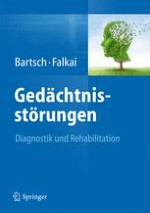Zusammenfassung
In diesem Kapitel werden nach einer Einführung in die posttraumatische Belastungsstörung (PTBS) Veränderungen der Gedächtnisfunktionen bei dieser Störung beschrieben. Zu den Veränderungen des deklarativen Gedächtnisses gehören Defizite im verbalen und visuellen Arbeitsgedächtnis, erhöhte retroaktive Interferenz, Probleme im autobiographischen Gedächtnis und eine fragmentierte und statische Erinnerung an das Trauma, in extremen Fällen auch eine Amnesie. Als nichtdeklarative Veränderungen im Gedächtnis wurden eine verstärkte Akquisition und verzögerte Extinktion bei der hinweisreizbezogenen Furchtkonditionierung, die besonders bei traumarelevanten unkonditionierten Reizen auftritt, sowie eine defizitäre Kontextkonditonierung und erhöhtes Priming beschrieben. Veränderungen im Hippokampusvolumen, die der Störung vorausgehen, aber auch eine Folge der Traumatisierung sein können, sowie präfrontale Veränderungen dürften das neurobiologische Korrelat der Gedächtnisprobleme bei der PTBS sein. Konsequenzen dieser Befunde für die Diagnostik und Therapie sind eine genaue Erfassung der gedächtnisbezogenen Probleme der Patienten und eine besondere Betonung der Integration deklarativer und nichtdeklarativer traumabezogener Gedächtnisinhalte mit einem Fokus auf der korrekten Einordnung des traumatischen Ereignisses in den räumlich-zeitlichen Kontext.











